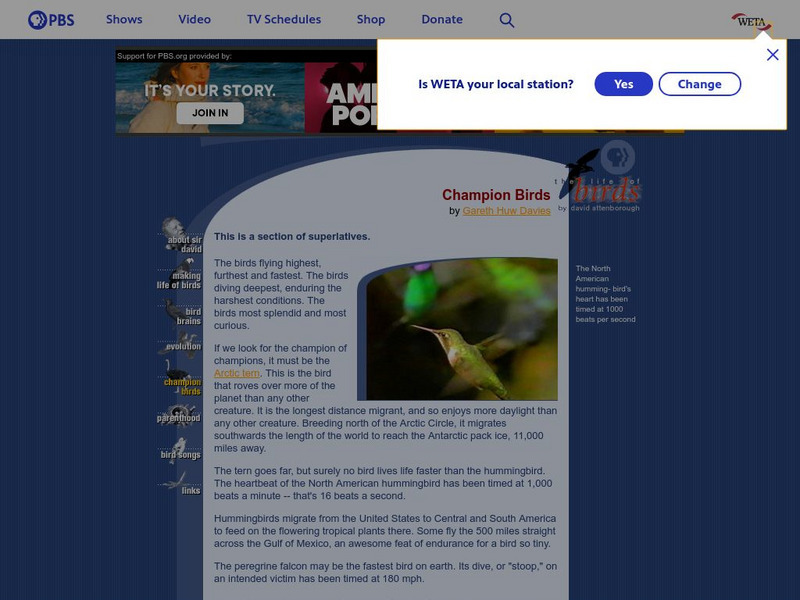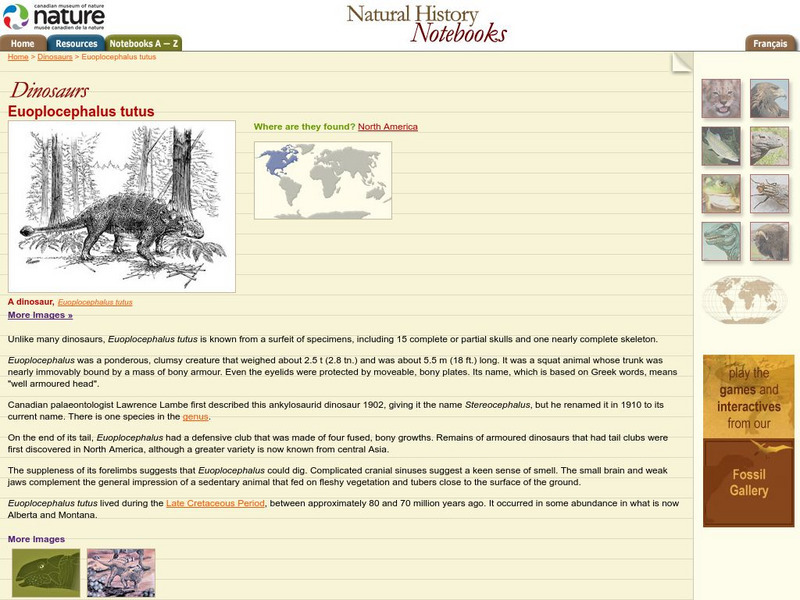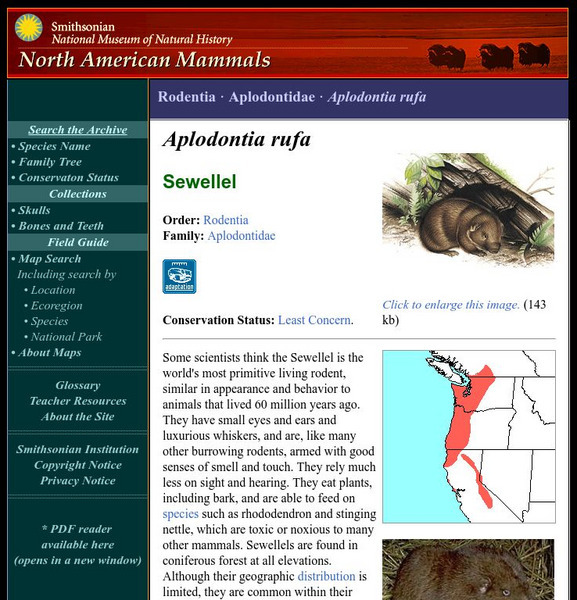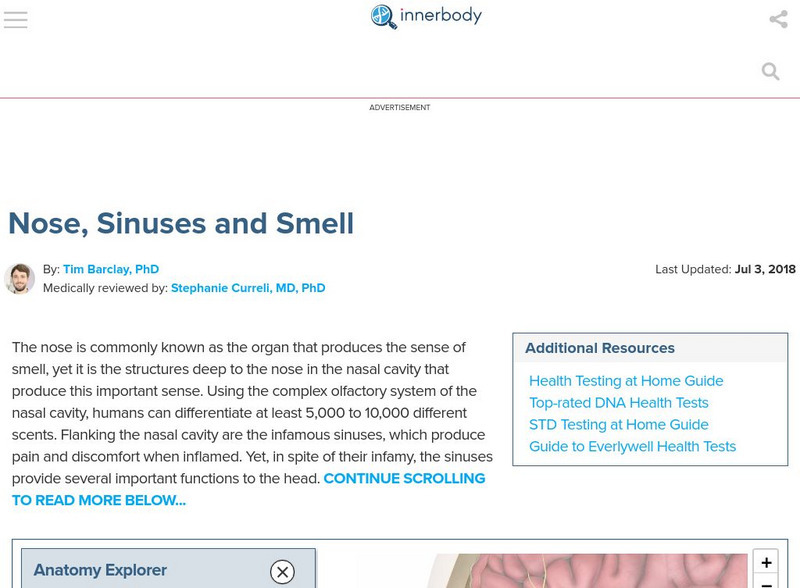Maryland Science Center
Maryland Science Center: Smelly Lemurs [Pdf]
Test your sense of smell as you learn about how lemurs communicate.
Other
Society for Neuroscience: Brain Facts [Pdf]
This is a publication on the human brain and how it works. Gives details on the neuron, how the senses interact with the brain and much more. PDF (requires Adobe Reader).
Curated OER
University of Washington: Nose Structure and Function
Discusses how the structures of the noseinteract to produce our sense of smell.Has links to lab activities and teacher lessonson this topic.
Curated OER
University of Washington: Nose Structure and Function
Discusses how the structures of the noseinteract to produce our sense of smell.Has links to lab activities and teacher lessonson this topic.
PBS
Pbs Teachers: Scientific American: Science and the Brain
Describe the "mush-brain" effect, and test blindfolded subjects for their ability to identify items by smell. Explore the effect of biofeedback to help overcome illnesses, and attempt the mind-over-body techniques of visualizing and...
Curated OER
Web Gallery of Art: The Sense of Smell
An image of "The Sense of Smell", created by Jan the Elder Brueghel in 1618 (Oil on panel, 65 x 109 cm).
Curated OER
Web Gallery of Art: Conversation Piece (The Sense of Smell)
An image of "Conversation Piece (The Sense of Smell)", created by Jan Ii Ekels, c. 1791 (Oil on canvas, 66 x 60 cm).
Curated OER
Kids Health: Tu Nariz
Find out what happens when you inhale air through your nostril and how important is the sense of smell.
Houghton Mifflin Harcourt
Holt, Rinehart and Winston: Elements of Literature: Imagery Chart [Pdf]
A short graphic organizer for students in studying the literary element of imagery. Includes a definition and chart with five sections with examples, one for each of the senses.
Curated OER
Leffingwell and Associates: Olfaction
Provides a technical discussion of the anatomy and physiology involved in the receptors associated with the sense of smell. Includes pictures and formulas.
Curated OER
Leffingwell and Associates: Olfaction
Provides a technical discussion of the anatomy and physiology involved in the receptors associated with the sense of smell. Includes pictures and formulas.
Other
Ergonomics4 Schools: The Learning Zone: Aesthetics
The term 'aesthetics' concerns our senses and our responses to an object. If something is aesthetically pleasing to you, it is 'pleasurable' and you like it. If it is aesthetically displeasing to you, it is not pleasurable and you don't...
Curated OER
Leffingwell and Associates: Olfaction
Provides a technical discussion of the anatomy and physiology involved in the receptors associated with the sense of smell. Includes pictures and formulas.
Curated OER
Leffingwell and Associates: Olfaction
Provides a technical discussion of the anatomy and physiology involved in the receptors associated with the sense of smell. Includes pictures and formulas.
Curated OER
Leffingwell and Associates: Olfaction
Provides a technical discussion of the anatomy and physiology involved in the receptors associated with the sense of smell. Includes pictures and formulas.
Curated OER
Leffingwell and Associates: Olfaction
Provides a technical discussion of the anatomy and physiology involved in the receptors associated with the sense of smell. Includes pictures and formulas.
Society for Science and the Public
Science News for Students: Deet Confuses Mosquitoes
Discusses why DEET insect repellant is effective including research showing how a mosquito's sense of smell is confused by DEET, so it doesn't recognize a potential food source such as human skin.
TeachEngineering
Teach Engineering: Chemical Wonders
Students are introduced to chemical engineering and learn about its many different applications. They are provided with a basic introduction to matter and its different properties and states. An associated hands-on activity gives...
PBS
Pbs: Champion Birds
The PBS video series "The Life of Birds" is accompanied with this site. There are articles about several aspects of birds and their behavior. This one chronicles the highest, fastest, and most extreme birds. There are lots of examples.
Canadian Museum of Nature
Canadian Museum of Nature: Euoplocephalus
Among some the interesting details of the Euoplocephalus is its armored tail. A detailed description is provided here.
Smithsonian Institution
National Museum of Natural History: American Mammals: Mountain Beaver
Some scientists think the Mountain Beaver is the world's most primitive living rodent, similar in appearance and behavior to animals that lived 60 million years ago. They have small eyes and ears and luxurious whiskers, and are, like...
Michigan Reach Out
Newton's Apple: Why Do Bees Sting?
Lesson plan that explains why bees sting, how bee societies are organized and an activity for students to learn how bees communicate using pheromones.
Inner Body
Innerbody: Nasal Passages
This site from Innerbody.com provides a general overview of how the human nasal passages work. A second page illustrates the use of the nasal cavity with animation.


![Maryland Science Center: Smelly Lemurs [Pdf] Activity Maryland Science Center: Smelly Lemurs [Pdf] Activity](https://d15y2dacu3jp90.cloudfront.net/images/attachment_defaults/resource/large/FPO-knovation.png)
![Society for Neuroscience: Brain Facts [Pdf] Activity Society for Neuroscience: Brain Facts [Pdf] Activity](https://content.lessonplanet.com/knovation/original/113866-cd2169bec6c0105fc678c671521bd642.jpg?1661266885)


![Holt, Rinehart and Winston: Elements of Literature: Imagery Chart [Pdf] Graphic Holt, Rinehart and Winston: Elements of Literature: Imagery Chart [Pdf] Graphic](http://content.lessonplanet.com/resources/thumbnails/410053/large/bwluav9tywdpy2symdiwmduymc03nzuwlw5iazfsby5qcgc.jpg?1589985125)






